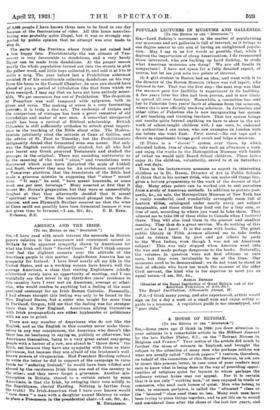AMERICA AND THE IRISH.
[To THE EDITOR or THE " SPECTATOE."] Sue —I have read with much interest the amounts in Britieh papers relative to the annoyance and resentment caused in Britain by the apparent sympathy shown by Americans for what the Irish call their " Sacred Cause." I don't think anyone need feel the slightest concern over the attitude of the American people in this matter. Anglo-Saxon America has no sympathy for Ireland. I have lived nearly all my life in the United States, and as a working woman have known well the average American, a class that visiting Englishmen (chiefly celebrities) rarely have an opportunity of meeting, and I can truthfully say that never in my thirty-five years' residence in this country have I ever met an American, average or other- wise, who would confess to anything but a feeling of the most profound contempt for an Irish Roman Catholic. Personally, I had always thought this feeling was only to be found in the New England States, but a sister who- taught for some time in Portland, Oregon, told me that the feeling was far stronger there than in New England. Americans allying themselves with Irish propagandists are either hyphenates or politicians with an axe to grind.
There- are- any number of Americans who do not like the English, and as the English in this country never make them- selves iii any way conspicuous, the American who doesn't like them has no hesitaney in saying so, publicly or otherwise, but Americans themselves, being to a very great extent easy-going People with a horror of a row, are afraid,to " throw down " the Irish, net because they have any sympathy with them or their grievances, but because they are afraid of-the Irishman's well- known powers of vituperation. Had• President Harding refused to write the letter he did- in support of the• campaign to raise funds for " suffering Ireland,"' he would have been vilified and abused by the. vociferous Irish from one and of the country to the other; and they never forget a grievance. Another- mis- conception in Britain, shared to a certain extent by some Americans, is that the Irish,, by swinging their vote solidly to the Republicans, elected Harding. Nothing is farther from the truth_l' No Irish-American that I have ever known would "turn down 'a man with a daughter named-Maloney in order to plece•a Freemesonin-the- presidential chair.—I- am, Sir, &c.,
M. RICHARDSON.


































 Previous page
Previous page